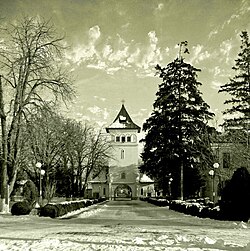Huși
| Huși | ||
|---|---|---|
| Municipality | ||
 |
||
|
||
 Location of Huşi |
||
| Coordinates: 46°40′27″N 28°3′35″E / 46.67417°N 28.05972°ECoordinates: 46°40′27″N 28°3′35″E / 46.67417°N 28.05972°E | ||
| Country |
|
|
| County | Vaslui County | |
| Status | Municipality | |
| Founded | 1487 (first official record) | |
| Government | ||
| • Mayor | Ioan Ciupilan (Social Democratic Party) | |
| Area | ||
| • Total | 5.2 km2 (2.0 sq mi) | |
| Elevation | 120 m (390 ft) | |
| Population (2002) | ||
| • Total | 33,320 | |
| • Density | 6.346/km2 (16.44/sq mi) | |
| • Demonym | Husean | |
| • Ethnicity |
Ethnic groups
|
|
| Time zone | EET (UTC+2) | |
| • Summer (DST) | EEST (UTC+3) | |
| Car Plates | VS | |
| Climate | Dfb | |
| Website | http://www.husi.info/ | |
Huși (Romanian pronunciation: [huʃʲ], Hebrew: חוש, Hungarian: Huszváros, German: Hussburg) is a city in Vaslui County, Romania, former capital of the disbanded Fălciu County in the historical region of Western Moldavia, Romanian Orthodox episcopal see, and home of some of the best vineyards of Romania. The city is located on a branch of the Iaşi-Galaţi railway, nine miles west of the Prut River and the frontier with the Republic of Moldova. In 2000, the city's population was 33,320, more than double the 1900 population of 15,404.
One theory states that Huși was founded in the 15th century by a colony of Hussites, from whom its name would have been derived; this has been disputed by renowned scholars such as Nicolae Iorga and the bishop Melchisedec, who argued that the name of the city is older, originating with the boyar Hus (whose name is also rendered as Husul or Husea), who owned land in the area.
The first document mentioning the city is a letter of December 17, 1487, sent by the Prince of Moldavia, Stephen III the Great, to the influential Saxon traders of Braşov; the text indicates that the letter had been sent from Huși. Soon after, Huși became one of the favorite places of residence of Stephen III, a fact which led to a noted rise in economical and political status for the following period.
...
Wikipedia

